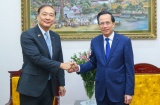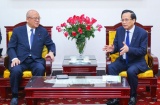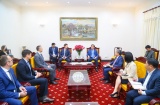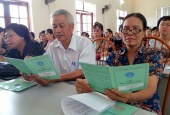ILO welcomes European Parliament’s approval for free trade deal with Vietnam
(LĐXH)- The International Labour Organization (ILO) welcomes the European Parliament’s vote for the approval of the free trade agreement between the EU and Vietnam on 12 February.
The agreement, known as EVFTA, was signed by both parties in Hanoi on 30 June 2019. When coming into effect, it is expected to bring economic benefits for both parties.
The EVFTA is a new generation FTA which has strong labour and environment requirements for sustainable development.
“There has been a growing and legitimate concern across the world that free flow of trade can broaden inequality between and within nations and can damage environment. The new generation of FTAs attempts to address sustainability challenge of free trade, by incorporating labour and environment requirements,” said ILO Vietnam Director Chang-Hee Lee.

Chapter 13 on Trade and Sustainable Development requires Vietnam and the EU “reaffirms its commitments, in accordance with its obligations under the ILO and the ILO Declaration on Fundamental Principles and Rights at Work […] to respect, promote and effectively implement the principles concerning the fundamental rights at work”.
They include the freedom of association and the effective recognition of the right to collective bargaining; the elimination of all forms of forced or compulsory labour; the effective abolition of child labour; and the elimination of discrimination in respect of employment and occupation.
This chapter specifically stipulates that each party will make continued and sustained efforts towards ratifying the fundamental ILO conventions.
Vietnam has ratified six out of eight fundamental of the ILO. The country’s latest ratification is Convention 98 on the Right to Organise and Collective Bargaining, for which the National Assembly voted yes in June 2019. Vietnam plans to ratify two remaining fundamental conventions: Convention 105 on Abolition of Forced Labour Convention in 2020 and Convention 87 on Freedom of Association and Protection of the Right to Organise in 2023.
“Labour and environment requirements of EVFTA would help to facilitate win-win and sustainable achievement for Vietnam by avoiding the “race to the bottom” and ensuring that the growth today does not come at expense of future generation’s opportunities,” said the head of ILO Vietnam.
Vietnam’s National Assembly is expected to vote on EVFTA in the coming session in May. If given the greenlight, the agreement will come into force one month after Vietnam and the EU have notified each other that the legal procedures have been completed.
Vietnam has been taking the opportunity of joining EVFTA and CPTPP (Comprehensive and Progressive Agreement for Trans-Pacific Partnership) to modernize its labour laws and industrial relations system. The adoption of the revised Labour Code in November 2019 brought its legal framework closer to ILO fundamental conventions. It creates necessary legal environment for modern Vietnam’s employment and industrial relations.
“Modern industrial relations based on recognition of freedom of association, together with better skilled workforce and effective social protection, is a key social driver for Vietnam to move towards upper middle income country in a sustainable manner”, said the Director of ILO Vietnam./.
Nguyen Thin
TAG:
EVFTA
new generation FTA












